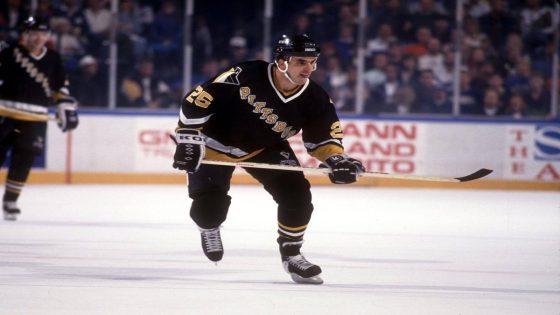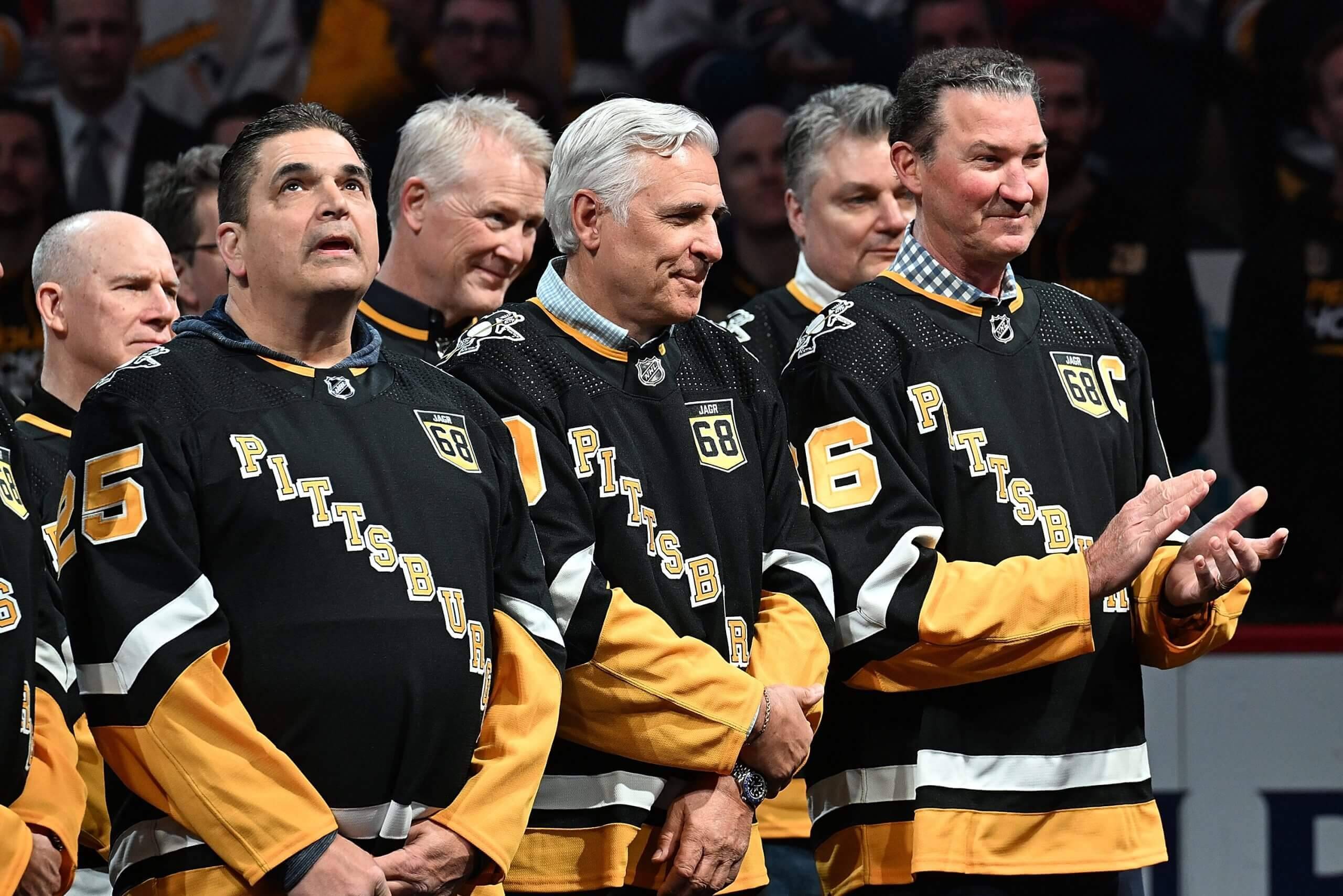PITTSBURGH — The good, the bad and the ugly of Kevin Stevens’ life has been chronicled in great detail because of the remarkable spectrum it has covered. Drugs, alcohol, arrests, rehabilitation, setbacks and ultimately a remarkable success story of giving back to the community. How can reporters not drool over that kind of material?
Stevens, forever the good-natured soul who isn’t afraid to discuss his wild life, has received headlines galore because of his post-hockey life. And for good reason.
However, on the day in which he will be inducted into the United States Hockey Hall of Fame, I feel we should take a moment to remember Stevens’ hockey career. For those who were too young to see him play, you probably don’t understand how great Stevens was. If you saw him play, you know, and you couldn’t possibly forget.
Let’s focus on a three-year span, when Stevens was truly at the height of his power. It’s one of the greatest runs in hockey history, let alone Penguins history.
From 1990 through 1993, Stevens was undeniably hockey’s greatest power forward and, frankly, one of its best players. His greatness during that time is often forgotten, but it shouldn’t be.
Let’s first consider the numbers:
• Stevens recorded 40 goals and 86 points in his breakout 1990-91 season.
• Later that spring, Stevens scored 17 postseason goals as the Penguins won the Stanley Cup for the first time. No one in franchise history — not Mario Lemieux, Jaromir Jagr, Sidney Crosby or Evgeni Malkin — has accomplished this feat. Only Reggie Leach, Jari Kurri and Joe Sakic scored more goals in one postseason.
• In the 1991-92 season, Stevens finished second to Lemieux in the NHL scoring race, erupting for 54 goals and 123 points. Neither Crosby nor Malkin have ever produced that many points in a season. He also added 254 penalty minutes that season, making sure Lemieux was protected at all costs.
• Stevens recorded 13 more postseason goals in the spring of 1992, again helping the Penguins to a championship.
• Stevens scored 55 goals and recorded 111 points in only 72 games during the 1992-93 season. Neither Crosby nor Malkin have ever scored that many goals in a season.
• He scored 63 power-play goals in those three seasons.
No, Stevens isn’t on the Penguins’ Mount Rushmore. Lemieux, Jagr, Crosby and Malkin’s faces are chiseled on that mountain. If there were a fifth person included, however, I’d vote for it to be Stevens, with all due respect to Ron Francis, Marc-Andre Fleury, Kris Letang and so many others.
The Penguins of the early ’90s were not only two-time champions but among the most talented and entertaining teams hockey has ever produced. They made the Penguins relevant. They probably should have won four or five championships. In Pittsburgh, they remain royalty.
They don’t win those championships without Stevens and make no mistake, he was no Lemieux creation. Stevens was a great player in his own right and during those three years, he was something to see.
Then May 14, 1993 arrived and changed everything. Stevens collided with Islanders defenseman Richard Pilon, whose helmet hit Stevens in the forehead, knocking him out while in midair, his face then crashing into the ice as his limp arms were unable to protect him. The Penguins’ burgeoning dynasty died a couple of hours later in overtime of Game 7 in the division finals on David Volek’s infamous goal. Of course it died, because nothing can live without a heartbeat, and Stevens was very much that team’s leader. So loyal to the Penguins’ logo was Stevens that in the moments before his immediate facial reconstructive surgery, he demanded a radio be placed by his hospital bed so he could listen to Mike Lange and Paul Steigerwald call overtime at the Civic Arena.
Stevens played in nine more seasons, scoring 134 more goals, but he was never the same. Breaking your face on the ice comes with consequences and many have always widely assumed it is what derailed his career. Surely it didn’t help. It should be noted, though, that on May 3, 1993 while visiting a Manhattan club one night after Lemieux’s iconic return from cancer treatments, Stevens was offered cocaine for the first time. He accepted, and his life was never the same.
Watching Stevens’ final decade in the NHL was painful because his physical tools seemed to evaporate so quickly. It behooves any Penguins fan to appreciate the greatness of Stevens’ prime.
A big man, the 6-foot-3, 230-pound Stevens could skate like the wind. He would routinely park himself in front of the opposition’s goal and score dirty goals at will. But he was more than a Patric Hornqvist type of player. Stevens had a wicked shot, the speed to burst past defensemen and the skill to complement the likes of Lemieux and Francis.
Those Penguins teams are largely remembered because they showcased prime Lemieux, and no matter your personal rankings in the greatest player of all time argument, it can be argued Lemieux was the most talented offensive force the game has ever produced. Then there was Jagr, practically a child in the early ’90s but already dominant. And there was Francis, the greatest two-way center of his time.
There were Hall of Famers in every direction, but other than Lemieux, no one was better than Stevens on those teams. He was a force on and off the ice. There were big personalities, and then there was him.
This was never more evident than late on the night of May 3, 1991. The Penguins had just fallen behind the Boston Bruins 2-0 in the Wales Conference Finals series. So upset was Stevens that he approached various groups of reporters following the game, famously telling each group that the Penguins were going to win the series and to print the prediction. They did.
He backed up every word. Stevens responded with four goals and eight points in his next three games as the Penguins reeled off four straight wins against the Bruins before winning the Stanley Cup for the first time two weeks later.
The Penguins went on to win the Cup again the next spring, after which Stevens would frequently say, “If someone else wants to win the Cup, you have to beat us four times.”
We’ll never know if the Islanders would have finished off their stunning seven-game upset if Stevens weren’t injured in the game’s early moments.
What we do know is that Stevens was an extraordinary player whose life took a dark turn. It was only fitting that after he was arrested in 2000 in St. Louis, Stevens’ first phone call from jail was to Lemieux. And it was even more fitting when, a year later, Lemieux made the decision to bring Stevens back to Pittsburgh, where he would finish his career.
Stevens, a scout with the Penguins to this day, bleeds black and gold. Pittsburgh has been the site of the happiest times of his life. Another such chapter will be written tonight when Stevens is inducted into the United States Hockey Hall of Fame.
No, it’s not the Hockey Hall of Fame, where Stevens’ considerable talents should have landed him. He will probably never make it there and, make no mistake, it haunts him. But tonight will mark quite a celebration for the big man.
That the ceremony is taking place in Pittsburgh is only fitting. Stevens is among the great Penguins of all time, and his hockey career — and life — shined while he played here. When Stevens needed help, there was Pittsburgh. When Stevens was one of the greatest of his time, it was in Pittsburgh.
When the Penguins of the early 1990s took the ice, Stevens was always the first player to follow the starting goaltender at the beginning of the line, his broad shoulders and big personality always daring anyone to beat them.
For a long, long time, life did beat Stevens down. Like the warrior he is, he willed his way back.
Today, he is living in Boston, is clean and is happily working for the Penguins. If you get a chance to chat with him, you’ll learn how committed he is to helping fellow addicts find their way to sobriety and a good life. You’ll also find that reminiscing about the early ’90s is his favorite pastime. Once upon a time, he lived well in Pittsburgh and, before things spiraled out of control, gave Penguins fans the good life while watching him operate.
Stevens the man and Stevens the hockey player will be honored tonight. The man is what’s most important, and if you know him, you love him. But the hockey player was pretty special, too.
(Top photo of Kevin Stevens in 1992: ALLSPORT)







